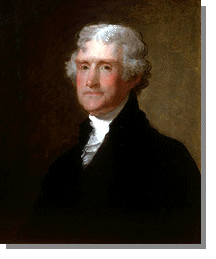![]()
 |
Thomas Jefferson wished to be remembered for three achievements in his public life. He had served as governor of Virginia, as U.S. minister to France, as secretary of state under George Washington, as vice-president in the administration of John Adams, and as president of the United States from 1801 to 1809. |
~ Declaration of Independence ~
Elected to the Second Continental Congress, meeting in Philadelphia, Jefferson was appointed on June 11, 1776, to head a committee of five in preparing the Declaration Of Independence. He was its primary author, although his initial draft was amended after consultation with Benjamin Franklin and John Adams and altered both stylistically and substantively by Congress. Jefferson's reference to the voluntary allegiance of colonists to the crown was struck; also deleted was a clause that censured the monarchy for imposing slavery upon America.
Based upon the same natural rights theory contained in A Summary View, to which it bears a strong resemblance, the Declaration of Independence made Jefferson internationally famous. Years later that fame evoked the jealousy of John Adams, who complained that the declaration's ideas were "hackneyed." Jefferson agreed; he wrote of the declaration, "Neither aiming at originality of principle or sentiment, nor yet copied from any particular and previous writing, it was intended to be an expression of the American mind."
~ Vice President ~
Jefferson became the reluctant presidential candidate of the Democratic-Republican party, and he seemed genuinely relieved when the Federalist candidate, John Adams, gained a narrow electoral college victory (71 to 68). As the runner-up, however, Jefferson became vice-president under the system then in effect.
![]()